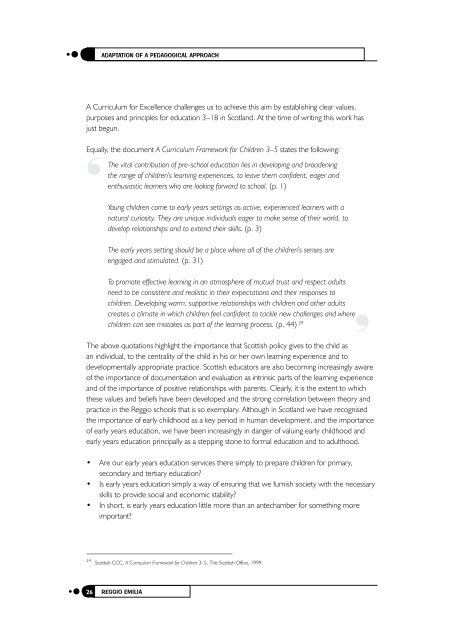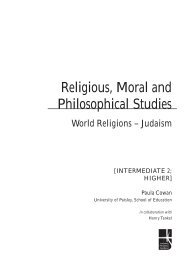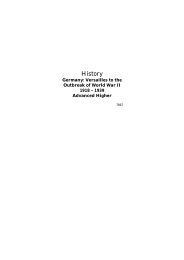The Reggio Emilia Approach to Early Years - Education Scotland
The Reggio Emilia Approach to Early Years - Education Scotland
The Reggio Emilia Approach to Early Years - Education Scotland
Create successful ePaper yourself
Turn your PDF publications into a flip-book with our unique Google optimized e-Paper software.
A Curriculum for Excellence challenges us <strong>to</strong> achieve this aim by establishing clear values,<br />
purposes and principles for education 3–18 in <strong>Scotland</strong>. At the time of writing this work has<br />
just begun.<br />
Equally, the document A Curriculum Framework for Children 3–5 states the following:<br />
�<br />
ADAPTATION OF A PEDAGOGICAL APPROACH<br />
<strong>The</strong> vital contribution of pre-school education lies in developing and broadening<br />
the range of children’s learning experiences, <strong>to</strong> leave them confident, eager and<br />
enthusiastic learners who are looking forward <strong>to</strong> school. (p. 1)<br />
Young children come <strong>to</strong> early years settings as active, experienced learners with a<br />
natural curiosity. <strong>The</strong>y are unique individuals eager <strong>to</strong> make sense of their world, <strong>to</strong><br />
develop relationships and <strong>to</strong> extend their skills. (p. 3)<br />
<strong>The</strong> early years setting should be a place where all of the children’s senses are<br />
engaged and stimulated. (p. 31)<br />
To promote effective learning in an atmosphere of mutual trust and respect adults<br />
need <strong>to</strong> be consistent and realistic in their expectations and their responses <strong>to</strong><br />
children. Developing warm, supportive relationships with children and other adults<br />
creates a climate in which children feel confident <strong>to</strong> tackle new challenges and where<br />
children can see mistakes as part of the learning process. (p. 44) 24<br />
<strong>The</strong> above quotations highlight the importance that Scottish policy gives <strong>to</strong> the child as<br />
an individual, <strong>to</strong> the centrality of the child in his or her own learning experience and <strong>to</strong><br />
developmentally appropriate practice. Scottish educa<strong>to</strong>rs are also becoming increasingly aware<br />
of the importance of documentation and evaluation as intrinsic parts of the learning experience<br />
and of the importance of positive relationships with parents. Clearly, it is the extent <strong>to</strong> which<br />
these values and beliefs have been developed and the strong correlation between theory and<br />
practice in the <strong>Reggio</strong> schools that is so exemplary. Although in <strong>Scotland</strong> we have recognised<br />
the importance of early childhood as a key period in human development, and the importance<br />
of early years education, we have been increasingly in danger of valuing early childhood and<br />
early years education principally as a stepping s<strong>to</strong>ne <strong>to</strong> formal education and <strong>to</strong> adulthood.<br />
• Are our early years education services there simply <strong>to</strong> prepare children for primary,<br />
secondary and tertiary education?<br />
• Is early years education simply a way of ensuring that we furnish society with the necessary<br />
skills <strong>to</strong> provide social and economic stability?<br />
• In short, is early years education little more than an antechamber for something more<br />
important?<br />
24 Scottish CCC, A Curriculum Framework for Children 3–5, <strong>The</strong> Scottish Office, 1999.<br />
REGGIO EMILIA<br />
�

















